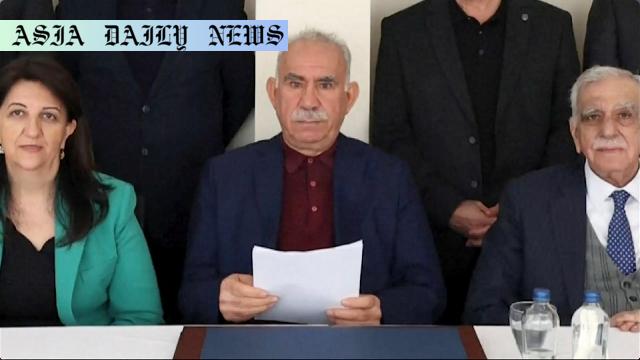PKK ceasefire declared as Kurdish militant group responds to its leader’s call to disarm and dissolve after decades of conflict.
PKK militant group declares a ceasefire after 40 years of conflict.
Announcement follows leader Abdullah Ocalan’s call for disarmament.
Potential turning point in decades-long hostilities with Turkey.
Past Turkish military action escalated after alleged terrorist attacks.

Introduction: Historical Context of the PKK-Turkey Conflict
The Kurdish PKK (Kurdistan Workers Party) has been at the heart of a bloody and protracted conflict with the Turkish government since 1984. Formed to advocate for Kurdish independence and greater political autonomy, the group has employed armed resistance, drawing international scrutiny and widespread condemnation. The Turkish government, along with other entities such as the United States and European Union, has labeled the PKK a terrorist organization. Over the years, the conflict has claimed tens of thousands of lives, displaced communities, and fueled bitterness on both sides. A recent development, however, has brought a glimmer of hope after decades of violence—a PKK ceasefire declared in response to its leader Abdullah Ocalan’s call to disarm and dissolve the organization.
Abdullah Ocalan: The Imprisoned Leader’s Call for Peace
Abdullah Ocalan, the PKK’s charismatic and controversial leader, has been in Turkish custody since 1999, serving a life sentence on Imrali Island prison. Despite his incarceration, Ocalan remains a prominent figurehead for the movement and wields significant influence over PKK decision-making. In a surprising statement made through intermediaries who recently visited him in prison, Ocalan urged all Kurdish militant groups to lay down their arms, emphasizing that armed resistance was no longer a viable or effective strategy for achieving Kurdish aspirations. He went so far as to call for the dissolution of the PKK itself, marking a profound shift in his stance and signaling a potential new chapter of peace and reconciliation.
The PKK’s Ceasefire Declaration
On Saturday, the PKK responded to Ocalan’s appeal by announcing a unilateral ceasefire. According to a media outlet with close ties to the militant group, the PKK agreed to halt all hostilities effective immediately but reserved the right to defend itself if attacked. This decisive move has been interpreted as a serious commitment to ending the armed conflict, providing a rare sense of optimism in a situation marked by decades of distrust and violence. However, the group’s insistence on self-defense underscores the fragile and tentative nature of this arrangement, raising questions about its long-term feasibility.
The Road Ahead: Challenges to Sustainable Peace
While the PKK’s ceasefire declaration is undoubtedly a significant and welcome step forward, achieving lasting peace between Turkey and the Kurds will require extensive negotiations, trust-building, and mutual concessions. The Turkish government, which has taken a hardline approach against the PKK, must now decide how to respond to this gesture. In recent years, Turkey has intensified its military campaigns against Kurdish militant positions in northern Syria and Iraq, often justifying its actions as counter-terrorism measures following alleged attacks. Any failure to engage constructively with the ceasefire could risk reigniting tensions and perpetuating the cycle of violence.
Humanitarian and Regional Implications
The ceasefire holds significant implications not only for Turkey but also for the Kurdish population across the region. Decades of conflict have inflicted widespread suffering on civilian communities, with many enduring displacement, economic hardship, and human rights abuses. A lasting peace agreement could allow for much-needed socioeconomic development, reconciliation initiatives, and improved relations between the Turkish state and its Kurdish minority. Regionally, resolving the PKK issue could also bolster Turkey’s security and foreign policy objectives, particularly in its complicated dealings with Syria and Iraq where Kurdish dynamics play a central role.
Conclusion: A Hopeful but Uncertain Future
If the PKK’s ceasefire holds and is met with reciprocal goodwill from the Turkish government, it could pave the way for one of the most significant peace processes in modern times. However, the road to reconciliation is fraught with challenges, including deep-seated animosities, political agendas, and regional complexities. While the ceasefire marks an important milestone, sustained efforts from all parties will be crucial to transforming this moment of hope into enduring peace.



Commentary
The Historical Significance of the PKK Ceasefire
The announcement of a ceasefire by the PKK represents a monumental moment in the decades-long conflict between the Kurdish militant group and the Turkish government. For over forty years, this conflict has shaped the political and social landscape of Turkey and the broader region, leaving behind a legacy of division, trauma, and unfulfilled aspirations for Kurdish autonomy. The decision of the PKK to heed Abdullah Ocalan’s call to disarm demonstrates both the group’s recognition of the futility of prolonged violence and their willingness to seek alternative avenues for advancing their cause. Such moments are rare in history, and their potential for reshaping entrenched conflicts cannot be overstated.
Challenges to Peaceful Resolution
Despite the optimism surrounding the ceasefire, the path to lasting peace remains fraught with difficulties. Trust is a scarce commodity in this context, with decades of violence and mutual hostility creating a significant barrier to dialogue. Moreover, the Turkish government’s consistent labeling of the PKK as a terrorist organization complicates its ability to engage with the group as a legitimate political entity. The risk of provocations or missteps on either side could easily derail the fragile progress made thus far. For peace to endure, it will require genuine commitment, not just from the PKK and Turkey but also from regional and international stakeholders who have a vested interest in stability.
Hope for the Future
Nonetheless, this ceasefire offers a glimmer of hope for a future where armed conflict no longer defines the relationship between Turkey and its Kurdish population. If this moment can be seized upon constructively, it might even serve as a model for resolving other protracted conflicts. The international community must watch closely, supporting efforts toward reconciliation while encouraging restraint and diplomacy. While the work ahead is daunting, the potential rewards—in terms of peace, stability, and shared prosperity—are immeasurable.